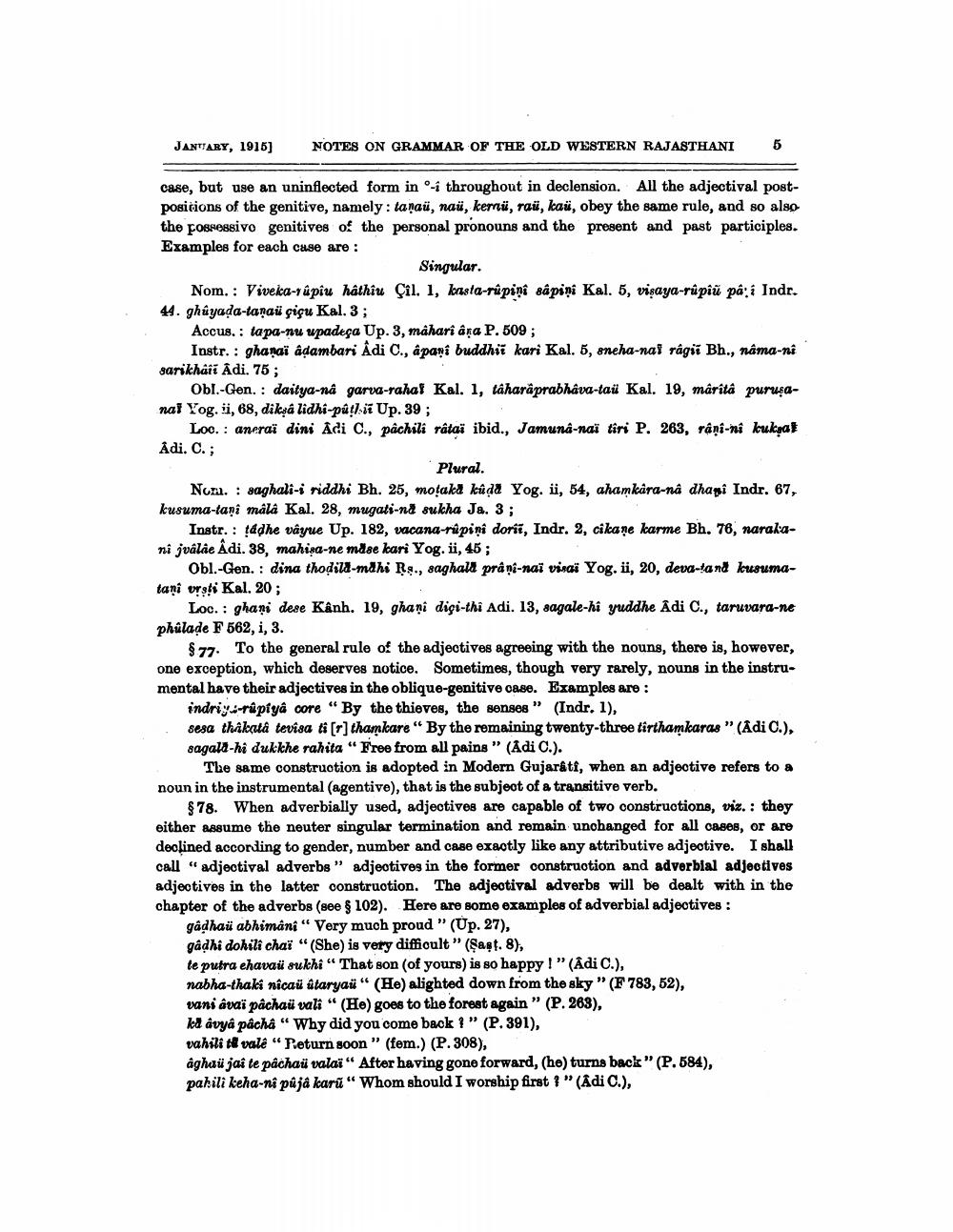Book Title: Indian Antiquary Vol 44 Author(s): Richard Carnac Temple, Devadatta Ramkrishna Bhandarkar Publisher: Swati Publications View full book textPage 9
________________ JANTIARY, 1916] NOTES ON GRAMMAR OF THE OLD WESTERN RAJASTHANI 5 case, but use an uninflected form in -1 throughout in declension. All the adjectival postpositions of the genitive, namely: tanaü, naü, kernü, raü, kaü, obey the same rule, and so also the possessivo genitives of the personal pronouns and the present and past participles. Examples for each case are : Singular. Nom. : Viveka-úpiu háthiu Çil. 1, kasta-rüpiņi sāpini Kal. 5, visaya-rúpiù på i Indr. 44. ghấyada-tanaü çiçu Kal. 3; Accus.: tapa-nu wpadeça Up. 3, mahari âra P. 509 : Instr. : ghanai adambari Adi C., & pani buddhit kari Kal. 5, aneha-nal ragii Bh., nama-ni sarikhaii Adi. 75; Obl.-Gen.: daitya-na garva-rahal Kal. 1, taharâprabhava-tai Kal. 19, marità purusanal Yog. 1, 68, diksa lidhi-pâti Up. 39; Loc. : anerai dini Aci C., pâchili râtai ibid., Jamuna-nač tiri P. 263, râni-ni kukat Ådi. C.; Plural. Nom : saghali-i riddhi Bh. 25, motaka kůda Yog. ii, 54, ahamkara-na dhani Indr. 67, kusuma-taņi mala Kal. 28, mugati-nd sukha Ja. 3; Instr. : adhe váyue Up. 182, vacana-rupini dorii, Indr. 2, cikane karme Bh. 76, narakani jválae Adi. 38, mahisa-ne mase kari Yog. ii, 45 ; Obl.-Gen. : dina thodila-mdhi Rs., saghalt prani-nai visai Yog. ii, 20, deva-tand kusumatani vrsti Kal. 20; Loc. : ghani dese Kanh. 19, ghami digi-thi Adi. 13, sagale-hi yuddhe Adi C., taruvara-ne phúlade F 562, i, 3. $77. To the general rule of the adjectives agreeing with the nouns, there is, however, one exception, which deserves notice. Sometimes, though very rarely, nouns in the instrumental have their adjectives in the oblique-genitive oase. Examples are : indriyu-rúpfya core “By the thieves, the senses" (Indr. 1), sesa thakata tevisa ti (r) thamkare" By the remaining twenty-three tirthamkaras" (Ådi C.), sagala-hi dukkhe rahita " Free from all pains" (Adi C.). The same construction is adopted in Modern Gujarati, when an adjective refers to a noun in the instrumental (agentive), that is the subjeot of a transitive verb. $78. When adverbially used, adjectives are capable of two constructions, viz. : they either assume the neuter singular termination and remain unchanged for all cases, or are deoļined according to gender, number and case exactly like any attributive adjective. I shall call “ adjectival adverbs” adjeotives in the former construction and adverbial adjectives adjectives in the latter construction. The adjectival adverbs will be dealt with in the chapter of the adverbs (see & 102). Here are some examples of adverbial adjectives : gadhai abhimani“ Very much proud" (Up. 27), gadhi dohili chaï " (She) is very difficult " (şaşt. 8), te putra ehavaü sukhi “That son (of yours) is so happy!” (Adi C.), nabha-thaki nicaü ataryaü" (He) alighted down from the sky " (F783, 62), vani avaï pâchai vali" (He) goes to the forest again " (P. 263), kd avya pacha " Why did you come back I" (P. 391), vahili til vale “Peturn soon " (fem.) (P.308), aghai jai te páchai valai" After having gone forward, (he) turns back"(P. 584), pahili keha-ni puja karų“ Whom should I worship first?" (Adi C.).Page Navigation
1 ... 7 8 9 10 11 12 13 14 15 16 17 18 19 20 21 22 23 24 25 26 27 28 29 30 31 32 33 34 35 36 37 38 39 40 41 42 43 44 45 46 47 48 49 50 51 52 53 54 55 56 57 58 59 60 61 62 63 64 65 66 67 68 69 70 71 72 73 74 75 76 77 78 79 80 81 82 83 84 85 86 87 88 89 90 91 92 ... 424
